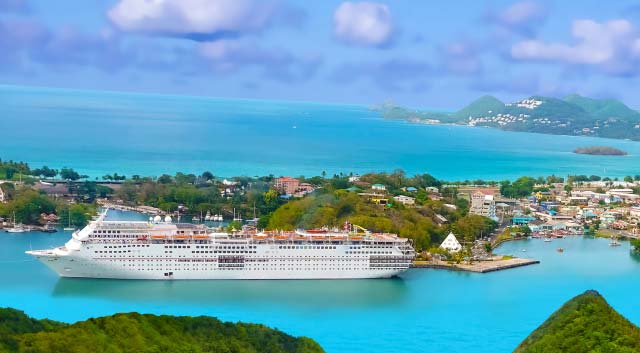How Travel Protection Can Help When Climate Disasters Cause Travel Disruptions

From fires in Maui and Greece to floods in California and the Northeast, climate-based disasters are coming for some of your favorite destinations. And while there’s no silver lining in tragedies like the Lahaina fire, there is the possibility for some peace of mind through the protection of travel insurance and assistance services.
How climate events are affecting travel destinations
A rise in world temperatures has had some marked effects on popular tourist destinations.
Rising sea levels and coastal destinations: Coastal cities, beaches, and islands are threatened by rising water levels and ocean acidification that has destroyed up to 15% of the world’s coral reefs. Jakarta is sinking and Venice is experiencing more frequent and severe floods, making parts of the city inaccessible at times.
Disappearing natural features: Axios reports that in addition to the erosion of coral reefs, some of Glacier National Park’s signature glaciers have shrunk by 80% in the last 50 years and Mount Everest has lost 2,000 years’ worth of ice in the last 30 years, making ascents of the mountain more difficult.
Intensifying weather patterns: Scientific American found that tropical cyclones are intensifying 1.8 meters per second each decade. Hurricane season is growing longer, and even California experienced a tropical storm in 2023.
Wildfires and air quality: Wildfires ravaged Greece and Canada in 2023, burning 180,000 acres and 27 million acres respectively after scorching the American West in previous years. This not only makes some destinations off-limits but severely affects air quality, making it unsafe for travelers with respiratory conditions.

Shifting wildlife patterns: Global temperature change is affecting migration and breeding patterns, making it harder for tourists wanting to experience the Great Migration in Africa or see polar bears in sub-Arctic destinations like Churchill, Manitoba.
Flight issues: According to Columbia University’s Climate School, higher temperatures make air less dense, so planes need more runway or more speed to take off – and that may not always be possible. In addition, temperatures over 100º F can melt tarmac and limit how long ground crews can work outside. Finally, warmer air aloft means more turbulence and turbulence-related flight disruption.
How travel protection can help with climate events
Travel insurance and assistance services can’t cool the world, but it can help travelers deal with some of the collateral damage.
Travel protection can provide:
Trip Cancellation and Interruption coverage
One of the most significant concerns with climate-related travel disruption is its unpredictability. The wind can shift, sending flames in the direction of your destination and forcing you to cancel or alter travel plans.
In addition, a sudden storm or unexpected turbulence might lead to flight cancellations, or a flood could cause mudslides, making it impossible for you to get to your destination or making your lodgings uninhabitable.
A robust travel protection plan, like those from Generali, can cover non-refundable, prepaid trip expenses. In tandem, the travel assistance included with a Generali plan can help you make alternative arrangements, up to and including evacuation.

Coverage for emergency medical situations
A worst-case scenario is something like the Lahaina fire – a weather-spurred catastrophe that results in injuries and fatalities and requires evacuation from a tourist destination.
Travel insurance may help with virtually every aspect of a disaster like this, from helping pay for emergency medical treatment to making arrangements for medical evacuation.
Even at stateside destinations where your health insurance can pay for many expenses, having travel insurance to supplement health coverage is smart – and having coverage for medical evacuation even smarter.
Coverage for baggage and personal effects
Most luggage isn’t wildfire or flood-proof, and even though you’re able to be rebooked from a storm-diverted flight, your luggage might not follow along.
Having ample coverage for lost or damaged baggage is a must in these climate-challenged travel times. Choose a plan like Generali’s Premium Plan, with $2,000 per person in Baggage coverage for lost, stolen, or damaged items, plus another $2,000 per person in Sports Equipment coverage, plus $500 per person in Baggage Delay coverage if your baggage is delayed for 12 hours or more during your trip.

Travel Delay coverage
If you're stranded at an airport due to a sudden storm, travel delay benefits can help cover your unexpected hotel stays, meals, and other essentials. The Premium Plan includes coverage of up to $300 per person in daily expenses to a total maximum of $1,000 per person.
Cancel for Any Reason coverage
If you’re traveling to a threatened area and want more latitude around what constitutes a covered reason for trip cancellation, consider Cancel for Any Reason coverage (CFAR).
CFAR won’t reimburse you for 100% of your expenses, and it carries a higher price premium over non-CFAR travel insurance, but it can provide unparalleled peace of mind in uncertain travel times.
Rental Car Damage coverage
Imagine a fast-moving wildfire bearing down on your vacation rental. You make it out but your rental car doesn’t. Or a hurricane knocks down a tree that takes out your rental car.
Travel insurance with rental car coverage can help cover unexpected damage to your rented vehicle. Generali’s Premium Plan includes up to $25,000 in coverage for rental car damage and the coverage can be added onto any other plan for an extra charge.
Rental Car Damage coverage is not available to residents of Texas.
Travel Assistance
Having experts on hand 24/7 can provide peace of mind when travel gets gnarly. The experts at Generali are highly trained, with years of experience dealing with some of the most difficult travel situations. They’re a great resource to have on your side.
How travelers can combat climate change
How can you help protect yourself from climate-related travel disruptions?
- Know the climate risks: Before planning a trip or purchasing insurance, research the climate risks associated with your destination and the time you’re visiting. Be more wary of booking a trip to the Caribbean on the fringes of hurricane season. Look at the long-range forecasts from the National Oceanic and Atmospheric Administration before planning a trip to the Rockies. Choose the shoulder season for trips to southern Europe.
- Read your insurance plan documents: Not all climate-related disruptions may be covered. For instance, canceling a trip because you’re afraid of wildfires is different than canceling a trip because wildfires have made your destination uninhabitable. Familiarize yourself with the terms and conditions of your travel plan, paying close attention to any exclusions.
- Choose the most robust travel protection plan you can afford: This means a couple of things – choosing a plan with the fewest number of exclusions for Trip Cancellation, Trip Interruption and other coverages, choosing the plan with the highest coverage levels to match the type of trip you’re taking, and making sure quality Travel Assistance Services are included.
- Stay updated: Once your travel dates are locked in, monitor the weather forecasts. This will give you an idea of any potential disruptions and help you make informed decisions. In addition to watching the weather, sign up for the Smart Traveler Enrollment Program through the State Department for regular updates on potential issues affecting your destination.
Our changing climate is changing travel. Being prepared and being flexible are more important than ever.
Being a climate-conscious traveler is a must as well. An important part of that is to help protect your travels with a plan from Generali. Our plans give you the freedom and peace of mind you need to travel safely in a changing world.
Get a quote today.
Travel Resources
See AllB005072309


